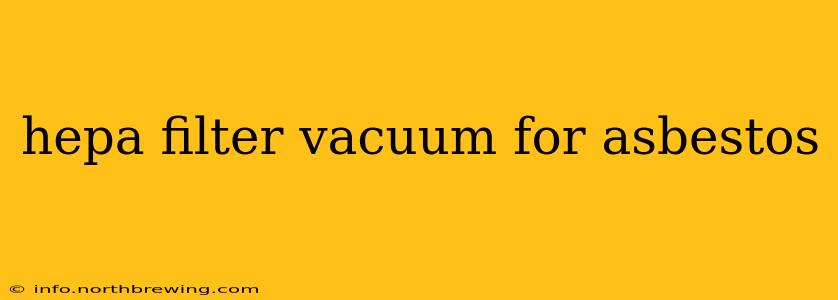Asbestos, a naturally occurring mineral once widely used in construction materials, poses a significant health risk due to its carcinogenic fibers. If you suspect the presence of asbestos in your home or workplace, attempting to clean it yourself is extremely dangerous. Always consult with a qualified asbestos abatement professional. However, understanding the role of a HEPA filter vacuum in asbestos cleanup can be crucial in minimizing risk during professional remediation. This guide will explore the use of HEPA filter vacuums in asbestos scenarios, addressing common questions and concerns.
What is a HEPA filter vacuum, and how does it work?
A HEPA (High-Efficiency Particulate Air) filter vacuum is designed to capture extremely small particles, including those as small as 0.3 microns. Asbestos fibers are often microscopic, making a HEPA vacuum crucial for minimizing airborne asbestos exposure. These vacuums use a powerful motor to draw air and particles into a bag or canister, where the HEPA filter traps the majority of the particles. The key difference between a standard vacuum and a HEPA vacuum lies in the filtration system; HEPA filters are much more effective at trapping tiny particles, including those posing a serious health risk.
Can a HEPA filter vacuum completely remove asbestos?
No. A HEPA filter vacuum is not a substitute for professional asbestos abatement. While a HEPA vacuum can help reduce the amount of airborne asbestos during a controlled abatement process, it cannot completely remove asbestos from a surface. Asbestos fibers can become deeply embedded in materials, making complete removal with a vacuum alone impossible. Professional abatement techniques involve careful removal and proper disposal of asbestos-containing materials, often requiring specialized equipment and training.
What type of HEPA vacuum is best for asbestos removal?
Only a specialized HEPA vacuum designed for asbestos removal should be used by professionals. These vacuums often have features that go beyond a standard HEPA filter, such as:
- HEPA filtration with a higher efficiency rating: Look for vacuums with a minimum of 99.97% efficiency at 0.3 microns.
- Sealed systems: This prevents the release of trapped asbestos fibers back into the environment.
- Durable construction: Built to withstand rigorous use in challenging conditions.
- Long-lasting filters: Frequent filter changes are crucial to maintain efficiency.
Are all HEPA vacuums suitable for asbestos cleanup?
No. While a standard HEPA vacuum can be helpful for general cleaning, it's not designed or certified for use with asbestos. Standard HEPA vacuums may not have the necessary filtration efficiency, sealed systems, or durability for safe asbestos cleanup. Using an inappropriate vacuum can increase the risk of exposure.
What precautions should be taken when using a HEPA vacuum near asbestos?
Even with a specialized HEPA vacuum, strict safety precautions are paramount:
- Professional supervision: Asbestos removal should always be conducted by trained professionals.
- Proper personal protective equipment (PPE): This includes respirators, gloves, and protective clothing.
- Containment: The work area should be carefully contained to prevent the spread of asbestos fibers.
- Disposal: All waste, including vacuum bags and filters, must be disposed of according to local regulations for hazardous materials.
How often should the HEPA filter be replaced in an asbestos removal vacuum?
The frequency of filter replacement depends on the duration and intensity of use. Always follow the manufacturer's recommendations for filter changes. Frequent replacement is crucial to maintain the vacuum's effectiveness and prevent the release of trapped asbestos fibers.
What are the legal requirements for using a HEPA vacuum during asbestos removal?
Legal requirements vary by location. Consult your local environmental protection agency or relevant regulatory body for specific regulations regarding asbestos abatement and the use of HEPA vacuum cleaners. Failure to comply with these regulations can result in significant penalties.
Disclaimer: This information is for educational purposes only and should not be construed as professional advice. Always consult with a qualified asbestos abatement professional before undertaking any asbestos removal or cleanup activities. Improper handling of asbestos can have severe health consequences.
